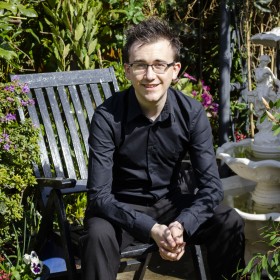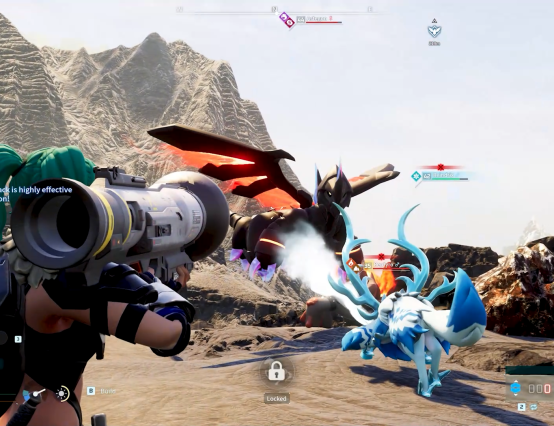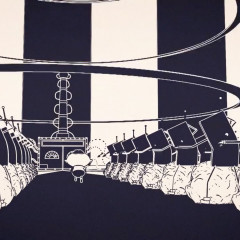We also reviewed Noise, and you can read our thoughts on it here.
New Creatives is a talent development scheme supported by Arts Council England and BBC Arts. Check out our New Creatives coverage in the New Creatives Voicebox.
[00:00:07] Chris: Hello there. And thank you for tuning in! My name is Chris Hill and I'm a contributor for Voice magazine, an online space for young people interested in arts and culture. Today, I'll be interviewing David Torre about his recent project for BBC's New Creatives, Noise. How's your day going today, David.
[00:00:24] David: Very well. Thank you.
[00:00:26] Chris: Oh, great. It's lovely to be talking to you. Why don't you tell the listeners a little bit about yourself?
[00:00:31] David: Well, my name is David Torre. I'm from Madrid. I spent some years seeing Canada snowboarding. Three years ago, I moved to Bristol to study animation, which I recently graduated. Yeah, that's about it.
[00:00:50] Chris: Brilliant. Awesome. You've graduated into the animation. What prompted you to go with this topic with your animation?
[00:00:56] David: Well, I think I came up with an idea for a very short story, someone running across around the world, shutting down screens because they were making noise.
[00:01:10] And when I read the brief for the New Creatives program, I thought that it would work very well. Although the original story changed completely to what the film came out to be, but it was more something that I was experiment... experiencing at the moment that: fatigue that it, in your mind, it almost creates a noise.
[00:01:34] It's like, overload of visuals, and it's hard to describe.
[00:01:40] Chris: That's really interesting. So, what were some of the technical challenges of producing it?
[00:01:47] David: Well, the timeline, the timing schedule, deadlines and everything was pretty tight. I had to do quite a few revisions from the original story, the script and the animatic.
[00:02:00] And then I actually did have loads of problems with rendering and different software versions and stuff not working. And yeah, that was a bit of a nightmare, but I guess just learning
[00:02:16] Chris: How many different revisions and versions did you think you have? Or I mean, did you think you went through before you got to the final product that we saw.
[00:02:24] David: From the original story?
[00:02:27] At least three or four and then the animatic another yeah, three or four, which maybe it's not that many, but it was in a very short amount, like, period of time. So, it felt like I was just constantly rewriting the same thing over and over.
[00:02:43] Chris: It reminds me of conversations I've had with authors about the endless kind of go-overs of their stories to create the finished product, I guess it... I guess when it comes to animation, we kind of see mainstream animation from DreamWorks and Disney and we think, "Oh, this must be their complete original vision and it's all turned out onscreen exactly as they imagined!" In reality no, of course it's not, it's probably gone through a gajillion revisions to get it to what we see!
[00:03:10] So it's interesting to hear a little bit about what goes on behind the scenes in an animation, especially in the creating the story process. So as though, in layman's terms for people like me, who haven't graduated in animation, how did you go about creating and animating the piece?
[00:03:27] Did you start out with a storyboard and then apply the animation? Where did you kind of noodle around the animation to create the story?
[00:03:33] David: No, I started with the story and a quick character design and environment design of just the room, and just to define how I wanted it to look, from then once the stories agreed on you start animating
[00:03:55] And then also another thing that I always consider when doing work, like on my own or, well, this one, I made it with my friend Paris; he did the modeling rigging and a few bits of the more technical stuff. You always have to consider what you can actually do, because if I want. I don't know how to make hair, for example, realistic DreamWorks style.
[00:04:21] So no one's going to have hair! It's going to be black and white, no thumbs, no fingers.
[00:04:27] Chris: I guess in that way; stylization comes from technical and time limitations and all that kind of thing. It's like if you had all the time in the world, you could research how to do goodness knows what and add it to the animation.
[00:04:39] But when you're in a very restricted time period, I guess then the style sort of emerges from the limits placed on your own time.
[00:04:46] David: Yeah. Yeah, absolutely. You don't want to... it's I dunno... it's about keeping it realistic, going, exploring a little bit. I like to think about it 50/50 doing 50% of things that I don't know how to do, and I'll figure it out.
[00:05:03] And another 50%, that is things that I know I can do. So that's like my, one foot that I'm on even ground and the other one exploring and trying to learn with every project that I do
[00:05:16] Chris: On a sort of technical aspect. What, kind of software did you use?
[00:05:20] David: This one was entirely made on Maya and then just, the like compositing, postproduction on After Effects and Premiere Pro, but all the animation and like look development was entirely done on Maya and rendered with Arnold with the Toon shader, which was my first time using it. Yeah, I think I like the way it came out. I liked the black and white style and lots of lines.
[00:05:54] Chris: Yeah. It was very striking. Was there a particular reason you went for that art style?
[00:05:59] David: Yeah. I've always been very interested in op-art, like optical art and optical illusions.
[00:06:08] Also a fair bit on just motion design, and I wanted to have those little segments that are a bit more oriented towards that side of animation.
[00:06:19] Chris: Because I noticed the Penrose triangles in the middle, so I take it that was a lot of the inspiration behind that sequence.
[00:06:26] David: Yeah. That one actually was quite a complex one to animate.
[00:06:30] Chris: I imagine! 'Cause I mean, how do you go about creating what is fundamentally impossible geometry in an animation environment that is designed to present you with geometry that could actually exist in the real world?
[00:06:44] David: Yeah, well luckily with the internet, there's pretty much tutorials and resources to learn how to do anything. So, after a couple hours browsing online and trying different ways to approach it, I made it work.
[00:07:01] Chris: Yeah. I've seen the kind of videos which describe how there's a rising trend of non-Euclidean games where the geometry doesn't work how you imagine it would and I guess that kind of falls within that bracket then.
[00:07:14] David: Yeah.
[00:07:15] Chris: So, Let's talk about some of the thematic elements of Noise. So, I think it's fair to say that there tend to be kind of themes of isolation, isolation kind of imposed on you by technology. Do you think that kind of changes meaning with the situation that we're in at the minute with coronavirus?
[00:07:31] David: Yeah, it's definitely an interesting topic that gives for a lot of thinking and conversation because the way I look at it is: one way we are lucky to be experiencing this global pandemic and this situation, having this technology that we can all still connect.
[00:07:57] Chris: Yeh and communicate.
[00:07:59] David: Yeah, exactly.
[00:08:00] But at the same time, it comes to show how screens can't replace people, like actual interactions. You can't just turn the entire world into online, 'cause it just doesn't work.
[00:08:17] Chris: And that seems to be a kind of idea of technology holding a sort of despotic rule over people's consciousness as well, as in kind of held hostage by the technology mentally, at least. What kind of drew you towards that as an idea you wanted to address in your film?
[00:08:34] David: I think it comes maybe from, realizing how... I don't know you've got your phone or your laptop and all the news and everything comes through that in some way.
[00:08:49] Like you might have, I don't know, work emails and then friends, email, like sending your messages, your mom, your girlfriend, and everything just comes through the same device. There's no... and it can be a bit, I don't know if you look at it from like a different perspective: I mean just unsettling. Like what is going on?
[00:09:14] Everything is just being jammed into this little device and I'm constantly looking at it.
[00:09:20] Chris: So, it kind of holds, yeah, kind of monopoly over peoples' thoughts. The ending sequence where he escapes into nature, is this I don't know, like a proposition to the watcher to see that there is escape from technology in the natural world?
[00:09:36] David: Yeah, I think the original, thought behind it was more about like the quality of the stuff that we see on the internet.
[00:09:46] And how much like useless content there is. And then that, ending sequence, it's more about if you're aware when you're getting that fatigue of just, like, looking at anything that you're being thrown at, just to like stop and give yourself some time to just look out the window, go for a walk and get some stimulus that is not through pixels and a screen.
[00:10:18] Chris: Those themes of the phones and things, banging drums, and it created a kind of very audible kind of effect of like what technology was doing, and that was really helped with the music. There was a wonderful job done to bring the kind of atmosphere.
[00:10:34] David: I was lucky to be able to work with our friend, Tim, he did an amazing job with the soundtrack and the sound design for it.
[00:10:43] Chris: Tying into that theme of noise, of course, which is part of the title of the film: I personally looked at it and was reminded of some of the research I've been doing recently into soundscapes.
[00:10:53] This idea of the worlds that is created around us by sounds and the whole idea of kind of reducing noise. Do you think we could be entering a new kind of soundscape age created by technology? Has the steam kind of been replaced by the Nokia ringtone and you know, the email alert?
[00:11:13] David: Yeah. Probably I would hope that yeah, noise reduction with more like electric engines and all these things becoming more popular would, yeah, reduce noise in cities. And, yeah, I guess all these notifications and maybe when being constantly surrounded by this electronic equipment on all the time, like little computer fans, constantly spinning.
[00:11:43] Chris: As a more kind of general thing: how did you become interested in animation? What drew you to it?
[00:11:49] David: I guess I've always been interested and I just, I remember all my schoolbooks, all the corners I used them to do like little flip-book animations with a stickman skateboarding.
[00:12:05] I hadn't really, clicked on animation until I applied for uni and they suggested looking into the animation course and yeah, I'm really happy that they did that because it was quite a mind opening, just looking at the creative world that I had always been doing graphic design and illustration, and just, I hadn't thought about becoming an animator and working professionally on animations, which has been very enjoyable so far and I'm really liking it.
[00:12:43] Chris: Is there a particular field in the industry that you'd like to go into for animation? Are you kind of interested in games or more into, film animation or more short form stuff like this particular piece?
[00:12:55] David: I would love to go into film eventually work my way into more of the story part of the production.
[00:13:05] Chris: So, the narrative aspect of animation kind of from what I've heard seems to grab you?
[00:13:10] David: Yeah. That's it. And then I also would like to be able to still do these experimental things to see... I like to, I don't know, every once in a while, just play around with the software and see what I can do in a day worth of work and just put something together really quick.
[00:13:30] Chris: So, do you have any particular inspirations in the animation field yourself?
[00:13:35] David: I'm pretty bad with these things remembering names, but eh, I would say yes.
[00:13:43] But from the top of my head...
[00:13:47] Chris: Sorry, I've put you on the spot here!
[00:13:49] David: I have no idea actually. No, I don't. I can't think of any like names that come to mind.
[00:13:57] Chris: You're welcome to say kind of more general stuff. Was there a particular film that you particularly appreciated the animation on or yeah, or a particular studio?
[00:14:06] David: I mean, I like things when like comedy in animation, obviously The Simpsons and South Park and, and then just when someone is able to tell a good story the right way. It's just always admirable. In any form. If it's, like a feature film or a short film, if it's a good story and just feels interesting and installed the right way.
[00:14:37] Chris: Definitely, and I feel like a little bit of that kind of appreciation for humor in animation definitely comes through in Noise; if it's just like the action section in the middle, or even at the end where he kind of breaks the fourth wall and hits the camera down, definitely an element of that kind of appreciation of comedy in animation comes through.
[00:14:56] So do you have any advice for -- you've told us a little bit about how you got into animation, knowing what you know now, what do you think would be your general advice for young people who wanted to get into it?
[00:15:08] David: Do it! I guess, and send thousands of emails and don't waste any opportunity or chance that you're given because they're scarce.
[00:15:20] Chris: In the words of the immortal Shia LeBeouf: "just do it!". You've just been telling me stories seem to be very much at the heart of your philosophy with animation and creating, engaging stories, but there's also definitely a kind of element of social commentary within this piece, and I guess I was perhaps getting into kind of deep questions now is like, does animation have a responsibility to reflect or critique the social space in which it exists or was created in?
[00:15:53] Or do you think it should always be story first and everything else second?
[00:15:58] David: I think we find stories interesting because they give us a new perspective on something. Maybe it's a completely new topic or something that we already know about that it's very familiar, but if the narrative is able to just shift your perspective, even if it's by a tiny bit, and you look at something from a different angle that makes you aware of new things and it adds to your reality, to the way that you look at things.
[00:16:31] I think that's what, I don't know, when you're creating, and especially film and animation, that's what you should aim for because otherwise you're not really adding anything to the viewer, you're just, it's like entertainment per se, rather than actually bringing some value to the table.
[00:16:56] Chris: Do you think animation's... do you think it's got its own advantages and disadvantages to be able to do that?
[00:17:03] David: Yeah, I think it seems to me that it's becoming more and more an accepted medium to tell stories also for adults and not so niche as it might have been a few years ago, but it's a still, Yeah, way behind live action and just normal storytelling like films and series.
[00:17:30] And I think with this, with lockdowns and not being able to go to work, there was lots of talking on how like animation is the only industry that is able to carry on because everyone can work remotely. And in what way, it seems like a hopeful moment for animation, but on the other hand as well you also have to educate the viewer and not everyone is going to suddenly start watching cartoons!
[00:17:59] So yeah. It's a bit of a tricky situation there.
[00:18:03] Chris: Do you think the future of animation is definitely kind of heading in the way of 3d? Or do you think it's possibly going to carry on being a bit of a mix of both as we've seen? Or do you think there's going to be a bit of a culture gap?
[00:18:17] Because of course Japan, with anime, has very strong 2d animation culture that perhaps we don't necessarily have in the West as much, with Disney going live-action, über-hyper-realistic 3d renderings, and literally creating new versions of their old classic 2d animated films. Do you think there's going to be some kind of shift there?
[00:18:43] David: I really hope they stop rebooting stuff with 3d and CG animation, it's a bit... it keeps going into the uncanny valley. Because even if you look at the whole film it's animated and it tries to be overly realistic, it still has a strange feel to it, and I hope the way that they go is more towards like the Spider-Man into the Spiderverse and even...
[00:19:21] I don't know if he came out because it was supposed to come out this summer: that SpongeBob, feature film.
[00:19:28] Chris: That's an interesting one, I've heard about it, but I don't know anything about it as coming out now.
[00:19:34] David: It's just the style, because it's 3D, but they were doing it in a more, their movements were closer to the like very textured and... I don't know it was a really interesting approach that I was looking forward to seeing, but then I haven't kept up.
[00:19:55] Chris: Definitely. I find it really interesting cause I feel like obviously I can't comment on the animation itself, but from a musician's perspective, I see the live action remakes of many of the, the new pieces I wonder if tonally, trying to recreate, you know, soundtracks that were created for a stylized animation don't work when you try and translate them into a live action, hyper realistic setting necessarily, because I think -- and I think a lot of, fellow music critics have said -- that whilst there are some great bits about the soundtracks to the new remakes, a lot of the songs just don't hit the same mark as they did in the original animation and I wonder if it's because of that tone shift, this kind of movement into realism where there wasn't before,
[00:20:44] Do you think they're slightly missing one of the biggest advantages of animation, the idea of stylization, of abstraction from reality?
[00:20:53] David: Yeah, I think, when you choose to tell a story with animation, there should be something that you add that can only be achieved through animation.
[00:21:06] So you have that on your side and if it's, yeah, I think with playing with the way that things look... it's the, the easiest or the way that makes the most sense like, that Lion King, which I enjoyed the new one, like, cause it's, it's Disney, they know how to make things! So, you watch the whole thing.
[00:21:30] Chris: Although the removal of "Be Prepared" from the song list is absolutely criminal, and I will not forgive them for it because it's one of the best Disney villain songs ever written!
[00:21:40] David: Yeah, there were a few lines that were like my favorite from childhood and they removed them. Yeah. There’re enough news stories that can be told I would think that these studios, that have the best creatives and artists in the world would allow them some experimental freedom or at least a tiny bit, just try and develop something new.
[00:22:12] Chris: Yeah. Do you think we could do with maybe new stories to kind of much the new technologies that we're getting in animation? Do you think we may be missing some of the diversity of tone in modern animation?
[00:22:30] David: Yeah, at least on the stuff that gets, mainstream sort of publicity.
[00:22:36] Chris: I guess that's the killer is the fact that it needs to breach into the mainstream and not be stuck in the quiet corners of the internet.
[00:22:46] David: Yeah. Cause there's lots of like independent filmmakers and creators trying obviously to push those boundaries, create new narratives and different styles and there's yeah, lots of like surreal, just weird animation that I love finding those things.
[00:23:07] But yeah, I guess it's also like a very niche market that at the end of the day; these big features that we're talking about: they're products, so they need to sell and it's also a big marketplace. So, there's, I think are very, same with music, like what sells and then what musicians and people like to make. Sometimes two different worlds.
[00:23:36] Chris: Let's end up the interview with a few kind of, quick fire questions, so fundamentally, what do you hope young people in particular will take away from your film?
[00:23:46] David: I think if it makes someone just be a bit aware of, if they're starting to feel that noise creeping in their minds that they realize and give themselves some time off the screens to recharge and yeah, look at the sky, the trees.
[00:24:06] Chris: That's a message that a lot of people could do with right now, especially kind of as isolating as lockdown can be, not only socially, but also mentally. It's very easy to kind of get locked in your own head and... the headspace that you get by interacting with the internet and things. Or indeed your own work and just getting kind of focused down on one thing and, being bombarded by kind of feelings about one particular topic and then kind of getting a bit of perspective and going outside and going, ah, crikey, the world it's lovely and quiet, hopefully!
[00:24:38] Yeah. So, do you have any plans in the work at the minute? Do you have a kind of films on the go or projects that you're hoping to look into?
[00:24:47] David: Currently I'm trying to make freelancing work, and I'm lucky to be working with Calling the Shots in another little commission for BBC. I hope. Yeah. It seems like everything is a bit stuck at the moment, but I hope, you know, opportunities will arise.
[00:25:08] Yeah, I guess these early stages are the hardest, just slowly making my way into the industry and yeah, hopefully I'm able to work on my own projects too, which is most fun.
[00:25:24] Chris: Finally, then: where can people find out more about you and find some more of your work?
[00:25:28] David: My website https://daybizdesigns.com, on my Instagram that is @daybiz. On my website I've got pretty much all the films I've worked on, Instagram is having more like my comics that I like to make, and I read more just quick little random stuff.
[00:25:50] Chris: Well, thank you very much for coming on today to David.
[00:25:53] David: Oh, thank you for having me. I appreciate it.
[00:25:55] Chris: It's been an absolute pleasure. Lovely talking to you. As the listeners may know, my name is Chris Hill. You can find some of my articles on Voice. I tend to talk about music and gaming and quite frequently, the kind of intersection of the two.
[00:26:07] And I hope all our listeners have a great day and I will see you the next one. All right. Bye!
[00:26:17] Tom: Today's episode was made possible by Voice Magazine, an online platform for young people, interested in art and culture. You can read Voice over at voicemag.uk and find it on Twitter, Instagram and Facebook @voicemaguk. The voice contributors are also an Instagram over at @voice.extra. If you're looking for another podcast to listen to the contributors, release the Voice Extra podcast every Saturday, where they talk about the things they've produced and the culture they've been enjoying.
[00:26:44] If you liked this podcast, please consider helping us to make more with the donation of any amount at voicemag.uk/donate. Thanks to Kevin McCloud for the use of the track "Thief in the Night", you can find more of his work at incomputech.com. Tom Innis was the executive producer.








0 Comments